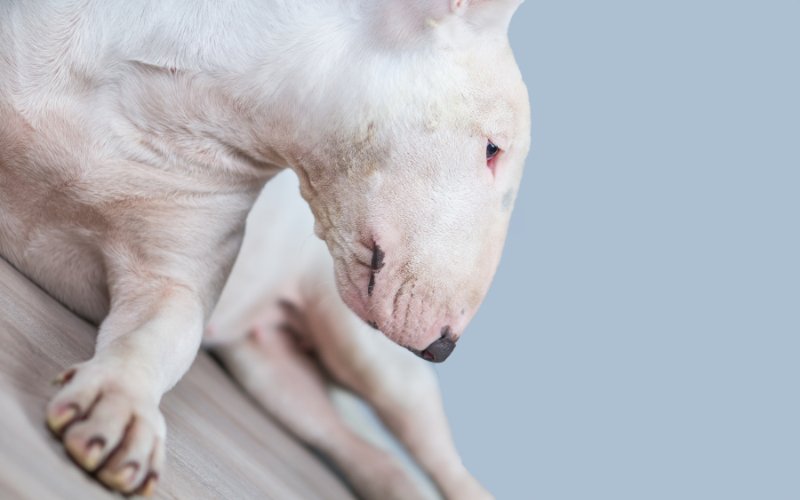
Why is my Bull Terrier so skinny?
|
Time to read 4 min
|
Time to read 4 min
©24K-Production via Canva.com
Bull Terriers are known for their strong and muscular bodies, therefore if your Bull Terrier is skinny, this is cause for concern. Poor nutrition, parasites, health conditions, and stress can all cause a Bull Terrier to be underweight. In this post, we'll look at why your Bull Terrier can become underweight and what you can do to help them get back on track.
Before we go into the reasons for an underweight Bull Terrier, let's have a look at what a healthy weight for this breed looks like. A healthy adult Bull Terrier should weigh between 22-32kg (50-70lbs) or 10-15kg (22-33lbs) in a miniature version, with males being somewhat bigger than females. If your Bull Terrier is significantly below this weight range, it's time to take action.
One of the most common reasons your Bull Terrier may be skinny is a lack of nutrients. This might occur if they're not getting enough food, eating the incorrect foods, or have a health condition that makes it difficult for them to absorb nutrients from their diet. Feeding them a diet insufficient in essential nutrients, vitamins, and minerals can lead to a number of health concerns including muscle weakness, skin and coat issues, and a weakened immune system.
It's important to provide them with a well-balanced diet rich in high-quality proteins, carbs, and fats to ensure they get all the nutrients they need for good health. Consult a veterinarian to establish the optimal diet for your Bull Terrier, taking their age, weight, and activity level into account. A proper diet is critical to keeping your Bull Terrier happy and healthy. We recommend trying this Slow Feeder Bowl With Built-in Scale so your Bull Terrier develops healthy eating habits.
Internal parasites such as roundworms, tapeworms, and hookworms are common in dogs and can cause severe health problems if left untreated. In Bull Terriers, these parasites can be especially problematic as they feed off the dog's nutrients, leaving them malnourished and unable to absorb the essential vitamins and minerals needed for optimal health. This malnutrition can result in a skinny appearance and a weakened immune system, leaving them susceptible to other health problems.
Symptoms of internal parasites in Bull Terriers can include diarrhea, vomiting, weight loss, and a pot-bellied appearance. Regular parasite screening and treatment are important in keeping your Bull Terrier healthy and free of these harmful parasites.
It should be noted that Bull Terriers are prone to specific health issues that might lead to weight loss. Digestive problems, liver disease, and potential cancer are among them. If you feel your dog has a medical issue, take them to the veterinarian as soon as possible for a complete checkup. Regular veterinary check-ups may help discover and treat these concerns early on, ensuring that your Bull Terrier stays healthy and happy.
Stress is another factor that may lead to weight loss in Bull Terriers. Changes in their surroundings, a lack of exercise or mental stimulation, or even a lack of social connection can all contribute to this. Chronic stress can reduce appetite and disturb the digestive system, resulting in weight loss. Stress can also compromise the immune system, making it more difficult for your Bull terrier to battle infections and other health issues.
The first step in helping an underweight Bull Terrier is to improve their diet. This might include eating higher-calorie foods, adding supplements to their meals, or feeding them smaller, more frequent meals throughout the day. A proper diet is essential for keeping your Bull Terrier in good shape. It is critical to provide them with balanced and healthy food that fulfills all of their nutritional needs. You may consult with your veterinarian about the appropriate diet for your Bull Terrier according to their age, weight, and activity level.
In addition to proper nutrition, regular exercise is also important for your Bull Terrier's health. Physical activity can help them retain muscle mass, enhance their metabolism, and reduce stress. A regular walk, playing, and interactive toys may provide your Bull Terrier with the physical and mental stimulation they need.
If your Bull Terrier has parasites, deworming is the first step in resolving the issue. If you suspect that your Bull Terrier may have internal parasites, it's important to schedule an appointment with your veterinarian as soon as possible. Your vet will be able to diagnose the problem and recommend the best course of treatment to eliminate the parasites and improve your Bull Terrier's overall health.
Under certain circumstances, your Bull Terrier may struggle to maintain their weight due to a health problem such as gastrointestinal issues or hormone imbalance. If your Bull Terrier is consistently losing weight, it is important that you seek veterinarian help. Your veterinarian will be able to run testing, detect any underlying health issues, and recommend a treatment plan that will help your Bull Terrier in regaining weight.
If your Bull Terrier is losing weight due to a medical ailment, it is critical that you address it as quickly as possible. Your veterinarian can diagnose the problem and provide a treatment plan to help your Bull Terrier recover.
Reducing stress in your Bull Terrier's life is important in promoting their overall health and helping them regain weight. Here are a few ways to reduce stress in your Bull Terrier:
There are many factors that can contribute to weight loss in Bull Terriers, from improper nutrition to underlying health problems. A Bull Terrier that is underweight is a reason for concern, but it is not a hopeless situation. You may assist your dog in regaining health and weight by providing proper nourishment, medical care, and stress management. If you're concerned about your Bull Terrier's weight, see a veterinarian for a diagnosis and to begin working toward a solution.
Happy petting!